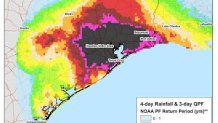Hurricane Harvey will go down as one of the costliest natural disasters in United States history. With destructive winds and a destructive floods this hurricane has been horrific.
How Rare is Harvey?
A category 4 hurricane landfall in the United States is unusual but certainly not unprecedented. The last was Charley in 2004. What makes Harvey so unique is the exceptional fresh water flooding in the Houston area. It appears that a large chunk of metropolitan Houston is dealing with a 1-in-1000 year flood - in other words a flood that has a 0.1% chance of occuring in any given year.

Harvey will come close to breaking the tropical cyclone rain record for Texas of 48" set back in Amelia in 1978. What makes this so much worse is the fact this extreme rainfall is falling in one of the most densely populated areas of the country.
How Was The Forecast?
The rainfall forecast for Harvey was phenomenal. For days prior to the flood in Houston forecasters were talking about record breaking rainfall. For several days our computer models all agreed on a huge flood threat and it most certainly verified.
Local
The intensity forecast for wind was more problematic. The National Hurricane Center's forecast 48 hours prior to landfall was for a strong tropical storm or minimal hurricane. The storm's actual intensity at landfall was a category 4 hurricane. If the hurricane made landfall in Houston, New Orleans, Tampa, Miami, or any other large city the initial busted intensity forecast could have been disastrous. A late and panicked evacuation likely would have been deadly.
Harvey shows us how far along computer modeling and forecasting has come - with a nearly perfect rain and flood forecast several days out. Harvey also reminds us of the shortcomings in hurricane forecasting. Periods of "rapid intensification" are notoriously challenging to predict. We have much work to do!
Did Climate Change Make Harvey Worse?
Maybe. Earlier today I posted something on Facebook and Twitter about how we really don't know right now how big (or little) of an impact climate change had on Harvey. The post managed to annoy liberals and conservatives on Twitter almost immediately.
The relationship between tropical cyclones and climate change is complex and poorly understood. For one, a warmer atmosphere is able to effectively "hold" more water vapor and therefore one could argue hurricanes would be able to produce increased precipitation rates as they make landfall. Increased rainfall from tropical cyclones in a warmer world is something many climate scientists agree on.
Professor Kerry Emanuel, a climate scientist at MIT, wrote about Harvey's exceptional rainfall today. He notes the frequently of tropical cyclone landfalls in southeast Texas, "shows no discernible trend in either the historical data or in the downscaled event. So the higher rainfall cannot be attributed to more frequent tropical cyclones."
While the frequency of tropical storms hasn't changed - temperature and steering currents have changed. Emanuel said the change in temperature (and therefore water vapor) isn't enough to explain the amount of rainfall.
As for the slow motion of the hurricane Emanuel did note a drop in the speed of modeled hurricanes over the last 7 years. Harvey's exceptionally slow movement is responsible for its extreme rainfall but Emanuel notes there is no long term signal for a drop in translational speed outside of the last few years which would indicate that climate change due to humans is not responsible.
Over the coming months and years research will be done as to what about Harvey can and can't be attributed to climate change. We know a lot about climate change but how a warming world will impact tropical cyclones in specific areas is much more uncertain.
What We Know Made Harvey Worse
Houston is the 4th largest city in the United States and has been growing at an incredible pace. The city has an elaborate system of bayous and reservoirs and it struggles to drain during most rain storms. This great piece by The Texas Tribune and ProPublica goes through some of the problems in Houston related to land use, urban srpawl, and poor urban planning.
Could Houston Have Been Evacuated?
Probably not. And certainly not safely. The vast majority of flood deaths occur in automobiles. The last time a large scale evacuation in Houston was ordered was ahead of Hurricane Rita in 2005 and it resulted in days of gridlock. Unfortunately, the sheer number of people and the sheer size of this flood event made it impossible to mass evacuate the city.
How To Help
NBC Connecticut is partnering with the Hartford Yard Goats to hold a Hurricane Harvey Relief Drive. Click here to learn more.



